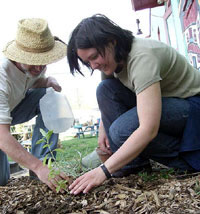
Actually, a garden is begun before a hole is dug. The first step in gardening is determining a philosophy of gardening. Whether the garden is for flowers or vegetables, three main philosophies exist: traditional, organic, and permaculture.
A traditional garden focuses on plants in well-defined gardens. These gardens can be laid out in rows, beds, or rooms, but each area is separate from the other. For vegetable gardens, long, straight rows usually run in a north to south orientation to take full advantage of the sun. For flower beds, the plants are usually planted in groups with the tallest plants in the back moving to shorter plants in front. Garden rooms can be created using traditional design elements. Gardeners using the traditional method tend to want plants with no blemishes; therefore, they are more prone to use more chemical or inorganic fertilizers and pest management systems. Also, mechanical means of working the soil are more often used.
The traditional garden makes the most of the sun exposure, is easy to cultivate and easy to weed and harvest. This type of garden is also better for mechanized tilling and easy to water. Some other considerations are that it uses more land area because of wasted space between rows or plants. Weeds root more easily in the open areas, and thus more pesticides are used.
In an organic gardening, the focus is on the soil. The organic gardener strives to work in harmony with nature. The organic gardener often wants an ecologically sound garden. This philosophy has three tenets: feed the soil, prevent pests and diseases, and IPM. To feed the soil, composing and mulching are important. Also, the use of natural or organic fertilizers is important. To control pests and diseases, use of organic products and natural predators is important. Integrated pest management is a pyramidal pest management system. It begins with the method that causes the least impact on the ecological system, and then moves up the pyramid until the problem is solved.
Organic gardening tends to be more ecologically friendly, easy to use with all types of gardens, and replenishes natural resources. Other considerations are that they are require manual work, little or no chemicals are used, and plants may have some damage by pests.
The last major philosophy of gardening is a permaculture garden. A permaculture garden is a sustainable garden that is a closed loop system with all or most of its needs being met from within its own environs. This type of garden focuses on the entire garden system. It relies mostly on perennial plants that should fulfill more than one function. Properly designed, a permaculture garden will do most of the work to maintain itself using plants, animals and land structure.
Permaculture gardens use little or no fertilizers or pesticides, require minimal watering (depending on climate), create symbiotic relationships similar to ones found in nature, can have generational lasting effects. Other considerations are unwanted guests in the form of fungi and pests, takes time to set-up and mature, and initial outlay can be expensive.
Knowing the gardening philosophies can help a beginning gardener decide on where to begin. From the quick and easy dig a hole and put in a plant of the traditional garden to the long-term, world-view of the philosophy of the permaculture movement, a beginning gardener can decide what is right for their philosophy of life; or they can combine different aspects from each philosophy to fit their lifestyle and views.